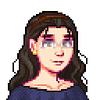Take a photo of a barcode or cover
dark
informative
mysterious
reflective
medium-paced
this is the companion piece to the film by teshigahara, which i strongly prefer. there is a lot of internal obsession that slows the pace and keeps the narrative from achieving that other-worldly, dreamlike quality of the film. enjoyed reading it, but it didn't knock me out the way the film does.
On the surface, this is a tale of a man who is tricked into living in a hole in the dunes with a widowed woman and his attempts to flee the situation. But his predicament, how he copes with it and the final outcome can be a commentary on life - the struggle between the old and the new, inner needs and external pressures or the individual versus society.
mysterious
medium-paced
challenging
dark
emotional
tense
medium-paced
Plot or Character Driven:
Character
Strong character development:
Complicated
Loveable characters:
No
Diverse cast of characters:
No
Flaws of characters a main focus:
No
Overall, this was a compelling and mysterious read. Mysterious not as much due to an actual solvable mystery of the plot, but more in the air of the writing and the character’s thoughts and musings. I saw another review described it as claustrophobic — that feels exactly right.
The beginning was slightly slow, but it picks up quickly and is not a long book overall anyway. The ending was sad but not unexpected. It reads almost like a fable or perhaps a cautionary tale.
I give it 3.5 stars because it held my attention and had me on the edge of my seat at times. I wouldn’t say it’s 4 stars throughout though. More like some parts were 5 star worthy and others were only 2.5 star worthy, so it sort of averaged out.
Semi-side note: I don’t understand why so many authors find r*pe so appealing to add to their stories, though. This book, House of Spirits, etc. It’s like they think there’s something poetic or edgy about it, but I can’t help but think there are other ways of getting your meaning across. Maybe that’s what the character would do — it’s not like these characters are portrayed as good people necessarily — but the description of them feels icky anyway, maybe because it doesn’t feel negative enough. I won’t pretend it’s my place to tell people what to write, especially not writers who have been dead for decades like Kobo Abe, but if you don’t like reading about that kind of thing, avoid this book!
The beginning was slightly slow, but it picks up quickly and is not a long book overall anyway. The ending was sad but not unexpected. It reads almost like a fable or perhaps a cautionary tale.
I give it 3.5 stars because it held my attention and had me on the edge of my seat at times. I wouldn’t say it’s 4 stars throughout though. More like some parts were 5 star worthy and others were only 2.5 star worthy, so it sort of averaged out.
Semi-side note: I don’t understand why so many authors find r*pe so appealing to add to their stories, though. This book, House of Spirits, etc. It’s like they think there’s something poetic or edgy about it, but I can’t help but think there are other ways of getting your meaning across. Maybe that’s what the character would do — it’s not like these characters are portrayed as good people necessarily — but the description of them feels icky anyway, maybe because it doesn’t feel negative enough. I won’t pretend it’s my place to tell people what to write, especially not writers who have been dead for decades like Kobo Abe, but if you don’t like reading about that kind of thing, avoid this book!
I wish I could give this book 3.5 stars. It is an incredibly well written book with vivid imagery and a thought provoking surreal narrative. Clearly an allegory, you could spend a great deal of time analyzing the book for broader meaning as I think multiple interpretations are possible. All that being said, I would not call it an enjoyable read. It is frustrating and claustrophobic and the constant descriptions of the sand made my skin crawl.
Por esses dias está fazendo 60 anos de lançamento do filme A Mulher da Areia do Teshigahara em Cannes, que vem a ser um dos meus filmes favoritos de todo cinema japonês.
Em honra disso finalmente resolvi ler a origem literária dele escrita pelo Kobo Abe, A Mulher das Dunas, sendo o segundo livro que leio dele (o primeiro foi A Face de um Outro, também adaptado para o cinema em forma de obra-prima pelo Teshigahara).
A experiência de ver o filme me fez repassar as várias leituras epistemológicas possíveis e a sua leitura só reitera a riqueza do simbolismo do filme, sobretudo na questão de imaginar Sísifo feliz do absurdismo de Camus. Aliás, poderíamos até imaginar que o próprio Camus teria escrito um livro assim.
Em honra disso finalmente resolvi ler a origem literária dele escrita pelo Kobo Abe, A Mulher das Dunas, sendo o segundo livro que leio dele (o primeiro foi A Face de um Outro, também adaptado para o cinema em forma de obra-prima pelo Teshigahara).
A experiência de ver o filme me fez repassar as várias leituras epistemológicas possíveis e a sua leitura só reitera a riqueza do simbolismo do filme, sobretudo na questão de imaginar Sísifo feliz do absurdismo de Camus. Aliás, poderíamos até imaginar que o próprio Camus teria escrito um livro assim.
A strange story that feels like an allegory or a dream, but also feels extremnely concrete. Some of the translation makes me wish I could read it in the original Japanese, because I'm sure I'm missing things, but the story itself is fascinating and existential.







